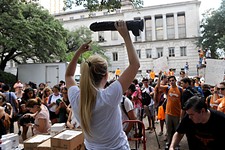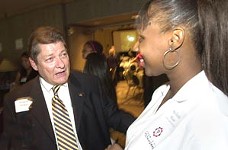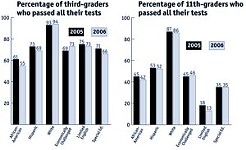Rethinking Reagan ... and LBJ
AISD searches for student and community involvement in high school redesign program
By Rachel Proctor May, Fri., Nov. 25, 2005

After final bell last Thursday at Reagan High, about 20 students gathered around four tables in room 341, an English and filmmaking room lined with computers and decorated with rock posters and exemplary student essays. Standing at the front of the room, student Quinton Favors surveyed the scene, then conferred quietly with teacher Elaine McGinty, who after a moment turned to the class.
"Can all the African-American students raise your hands?" she asked loudly. Hands went up at two of the tables. "All the people of Latin descent, please raise your hands," she said, drawing responses from the other two.
Favors cupped a stack of papers around his mouth like a megaphone. "Why are you not sitting together?" he boomed. With some prodding, the students spread themselves out for the beginning of a lively, at times tense, discussion of race relations at the Eastside school.
Vigorous Thursday afternoon discussions have become a regular thing in room 341, as students debate the problems facing their school and leave each week with a challenge: Next time, bring one more person. This flourishing of civic involvement couldn't be better timed – the Austin Independent School District is spending the year researching ways to redesign Reagan and LBJ high schools into a totally different high school model, and has made it clear they want large-scale student and community involvement in the planning. What remains to be seen is how smoothly the grassroots movement for change can integrate with the top-down effort.
"I'm operating under the assumption that we'll all have a say, but that remains to be seen," said teacher Trent Sharp of the redesign process, about which he is generally optimistic. He serves on Reagan's redesign committee, and along with McGinty and English teacher Angela Gatto has also been facilitating the informal discussions.
AISD's redesign effort kicked off last fall with a pair of district-commissioned studies citing organizational weaknesses in the district's 11 high schools. Those include not only floundering academics – poor math scores and one in five seniors not graduating – but also low participation in extracurricular activities and advanced coursework. These findings are by no means unique to AISD, and neither is redesign, which is the initiative du jour in educational policy circles. AISD's redesign mantra is breaking large, impersonal schools into "small learning communities," or SLCs, that enable greater academic rigor, tighter relationships, and better career relevance – the so-called "three R's" of redesign.
Rigor and relationships are definitely a sore spot for the Reagan students, but their complaints cut deeper than the official redesign rhetoric. There's been little discussion of racism, for example, which the students feel poisons relationships with some teachers and among the student body. The main solution proposed is the SLCs, and assigning each student an "advocate" to serve as an adult anchor in a sometimes alienating institution. The Reagan students, however, say they already know teachers who care – the problem is the presence of teachers who simply don't. "They think because they're at Reagan that we're slow or something," said Mychal Gadison at a discussion in October. The group issued a chorus of complaints about teachers who "think they're better than us," or who pass out worksheets and then spend the rest of class surfing the Internet.
Standing on a table to film the proceedings, Sharp pointed out that if the students were frustrated by their teachers, many teachers were frustrated by the students. "I hear teachers saying students don't care, and students saying that teachers don't care," he said. "Can you help explain why teachers think students don't care?"
The questions come easier than answers, but these are the kind of debates that AISD says it welcomes to the redesign conversation. Next week, AISD Director of Blueprint Schools (i.e., some of AISD's most troubled) Kent Ewing will take a group of about 50 Reagan students elected by their peers to UT for an all-day forum to share some of these concerns. Many of the afternoon-discussion students will serve as representatives. They'll look over student and teacher surveys of what's wrong with Reagan, and discuss the strengths and weaknesses of the redesign model under consideration. Later that week, a smaller group of students and community members will visit a redesigned school in Houston. The goal, says Ewing, is to figure out what the community wants Reagan to be.
"We want to develop a long-range plan to make Reagan one of the best schools in the city," he said. Ewing said he wasn't aware of the grassroots discussions on campus, but he was interested to hear the students' input. "It sounds like some natural leaders have risen to the top," he said.
One student who has felt that calling is senior Tashia Roberts, who since getting involved has added "activist" to her career goals (she'll begin by studying education at Texas State University next year). "The meetings really inspired me," she said. "There's so much that needs to be changed, and nobody's doing anything." Echoing Sharp's weekly reminder to bring "one more person" to the meeting each week, Roberts said she was excited to get other people involved. "I know that my voice isn't going to do anything on its own," she said.
The next round of community forums to discuss redesign will come in January.
Got something to say on the subject? Send a letter to the editor.










